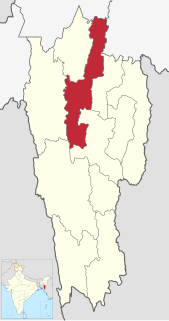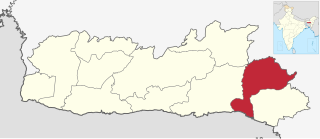
Meghalaya is a state in northeastern India. Meghalaya was formed by carving out two districts from the state of Assam: the United Khasi Hills and Jaintia Hills, and the Garo Hills on 21 January 1972. Meghalaya was previously part of Assam, but on 21 January 1972, the districts of Khasi, Garo and Jaintia Hills became the new state of Meghalaya. The population of Meghalaya as of 2016 is estimated to be 3,211,474. Meghalaya covers an area of approximately 22,430 square kilometres, with a length-to-breadth ratio of about 3:1.
Kota or KOTA may refer to:

Dima Hasao district, earlier called North Cachar Hills district, is an administrative district in the state of Assam, India. As of 2011, it is the least populous district of Assam.

Biate is a census town in Serchhip district in the state of Mizoram, India. Biate town has been selected as the cleanest town in Mizoram and Northeast.

Aizawl district is one of the eleven districts of Mizoram state in India. The district is bounded on the north by Kolasib district, on the west by Mamit district, on the south by Serchhip district, on the southwest by Lunglei district and on the east by Champhai district. The district occupies an area of 3,577 square kilometres (1,381 sq mi). The headquarters of the district is Aizawl city, the capital of Mizoram. As of 2011 it is the most populous district of Mizoram.

The Khelma, also known as the Sakachep are one of the old Kuki tribes of northeastern parts of India.
The Kuki-Chin languages are a branch of 50 or so Sino-Tibetan languages spoken in northeastern India, western Burma and southeastern Bangladesh. Most speakers of these languages are known as Mizo in Mizoram and Manipur. Also, as Kukī in Assamese and Bengali and as Chin in Burmese; some also identify as Zomi. Mizo is the most widely spoken of the Kuki-Chin languages.

The Biates are one of the hill tribes of Assam, Meghalaya, Mizoram, Tripura and Manipur .Their language belongs to the Tibeto-Burman family. Spread over many parts of North-East India, they have a unique identity with a rich and distinctive history, culture, dialect and religious heritages. They are one of the oldest hill tribes of North East India especially among the Chin-Kuki-Mizo family. The term Biate comes from the word Bia-te. The word ‘Bia’ or ‘Biak’ means ‘speak’ or ‘worship’. ‘Te’ is a suffix denoting plurality. Hence, the two words combine to form the word Biate, which means worshipper.
Biate is a Sino-Tibetan language spoken by the Biate people in several parts of Northeast India: in Meghalaya, Assam, Mizoram, Manipur and Tripura. Biate is pronounced as Bia-te (the e in te pronounced as "a".
Ranglong is a language is spoken in Seisimdung, Noagang, Zoitang, Lungkam, Zoinogor, Muolhui, Enhui, Vomthat, Kheuri-laikhuo, Rothabil, Laikhuo, Sorospur, Thumsip, Balidung, Ru-at, Saitha, Zarolian, villages in Tripura, Nurka, Langkhanphong, Pipla punjee, Zairal, Sobiri, Khulicherra, Jugicherra, Salganga, Kaisanary, Jamira villages in Assam and Luimawi village in Mizoram. The Ranglong people lives in a close and compact yet divided by three Indian federal states.

East Jaintia Hills district is a district with its headquarters at Khliehriat in Meghalaya state of India. The district was carved out of Jaintia Hills district on 31 July 2012.

West Jaintia Hills is an administrative District in the state of Meghalaya in India. The united district was created on 22 February 1972 and occupied an area of 3819 km2. It had a population of 270,352. The district is part of the Meghalaya subtropical forests ecoregion. With the bifurcation of the erstwhile Jaintia Hills District into East and West Jaintia Hills Districts, West Jaintia Hills District came into existence on 31 July 2012 with its headquarters at Jowai. Jowai is the host of all the heads of important governmental offices and establishments, educational institutions, hospitals, banking institutions, etc.

Fiangpui is a locality in Haflong town, the headquarters of Dima Hasao district, in Assam, India. With a population of 2051 people as of 2011, it is home to the Biate people. Located at a distance of 2 km from the main town area, one can experience the feeling of a blend of both village and urban lives in Fiangpui.

Saipung is a village in East Jaintia Hills district, Meghalaya, India. It is the headquarters of the Saipung Sub-Division. The population was 1,431 as per the 2011 Indian census. Located about 136 km from the state's capital Shillong, Saipung is inhabited by the Biate people.
Lungzubel which means "Stone rice beer containers or jars" in the Biate language are stone relics found in the southwestern part of Dima Hasao district in Assam and its surrounding areas extending to the neighboring state of Meghalaya.
Bedessa or Bedesa may refer to:








